International Toy Fair Nuremberg 2010
Internationale Spielwarenmesse Nürnberg 2010
| x |
|
|
|
|
|
|
|
|
|
|
|
|
|
|
|
|
|
|
|
|
|
|
|
|
|
|
|
|
|
|
|
|
|
|
| Queen Games |
|
|
| x |
|
|
|
|
|
|
|
|
|
|
|
|
|
|
|
|
|
|
|
|
|
|
|
|
|
|
|
|
|
|
|
|
|
|
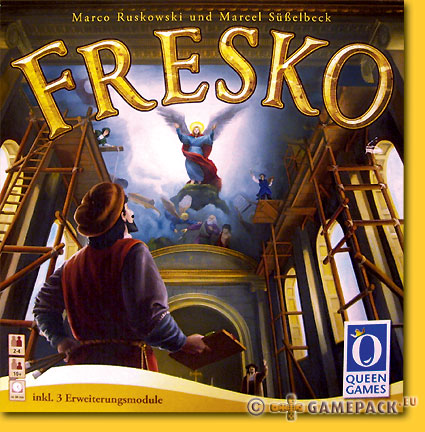 |
What time will I get up today? Not a very common question in a game, but in Fresko this is important as it fixes the prices on the market and the state of your mood, being tracked on the mood-o-meter. Getting up before other players also determines the player order. |
|
|
|
|
|
|
|
|
|
|
|
|
|
|
|
|
|
|
|
|
|
|
|
|
|
|
|
|
|
|
|
|
|
|
|
|
|
After this, players place five workers on a sheet behind their screen. They can activate a worker at the market, the dome, the workshop, atelier or theatre. The latter could be useful to increase a player's mood. |
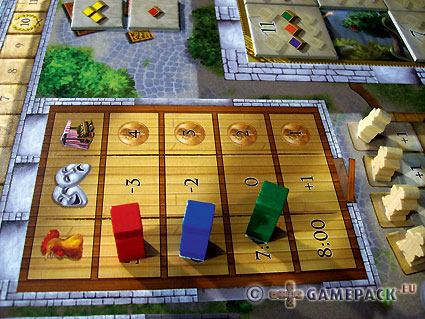 |
|
| x |
|
|
|
|
|
|
|
|
|
|
|
|
|
|
|
|
|
|
|
|
|
|
|
|
|
|
|
|
|
|
|
|
|
|
| When placing one worker at the market, a player may take one tile form the market that depicts one to three basic colours. In the dome, if a worker was placed on this location, the colours can be exchanged for tiles that eran points, with a bonus if the white pawn/bishop is on or next to that tile. In the atelier quite simply money is earned, and in the workshop the basic ingredients for paint are bought. |
|
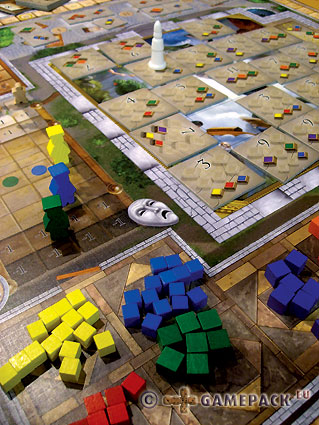 |
|
| x |
|
|
|
|
|
|
|
|
|
|
|
|
|
|
|
|
|
|
|
|
|
|
|
|
|
|
|
|
|
|
|
|
|
|
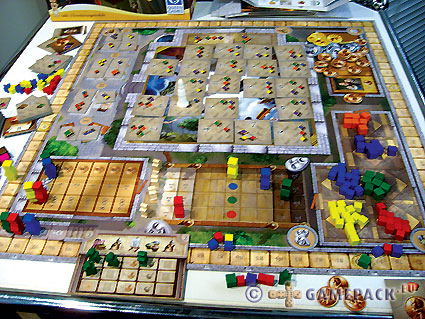 |
|
The game lasts until six or less tiles are in the dome. When this occurs a last round is called, where players now also can work at the altar for additional points. |
|
| x |
|
|
|
|
|
|
|
|
|
|
|
|
|
|
|
|
|
|
|
|
|
|
|
|
|
|
|
|
|
|
|
|
|
|
| In the extended game there are atelier cards that give a one time or constant privilege of some kind. Contracts in the workshops instantly earn points, money and resources per round. And there are additional mix colours (rosa and brown) that are difficult to make but earn more points in the dome. |
|
| x |
|
|
|
|
|
|
|
|
|
|
|
|
|
|
|
|
|
|
|
|
|
|
|
|
|
|
|
|
|
|
|
|
|
|
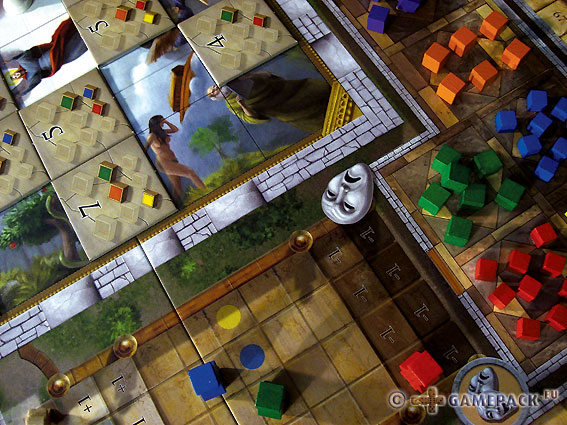 |
|
| x |
|
|
|
|
|
|
|
|
|
|
|
|
|
|
|
|
|
|
|
|
|
|
|
|
|
|
|
|
|
|
|
|
|
|
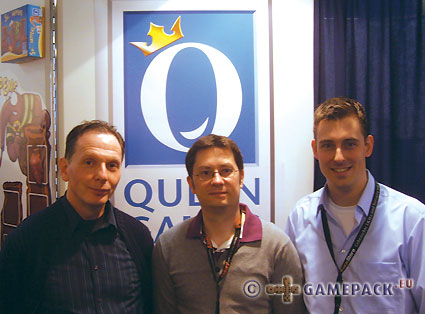 |
|
From left to right: Game author Wolfgang Panning, who helped to fine tune the game at Queen with the authors Marco Ruskowski and Marcel Süßelbeck. |
|
| x |
|
|
|
|
|
|
|
|
|
|
|
|
|
|
|
|
|
|
|
|
|
|
|
|
|
|
|
|
|
|
|
|
|
|
| Fresko, Marco Ruskowski & Marcel Süßelbeck, Queen Games, 2010 - 2 to 4 players, 10 years and up, 60 minutes |
|
| x |
|
|
|
|
|
|
|
|
|
|
|
|
|
|
|
|
|
|
|
|
|
|
|
|
|
|
|
|
|
|
|
|
|
|
| x |
|
|
|
|
|
|
|
|
|
|
|
|
|
|
|
|
|
|
|
|
|
|
|
|
|
|
|
|
|
|
|
|
|
|
| x |
|
|
|
|
|
|
|
|
|
|
|
|
|
|
|
|
|
|
|
|
|
|
|
|
|
|
|
|
|
|
|
|
|
|
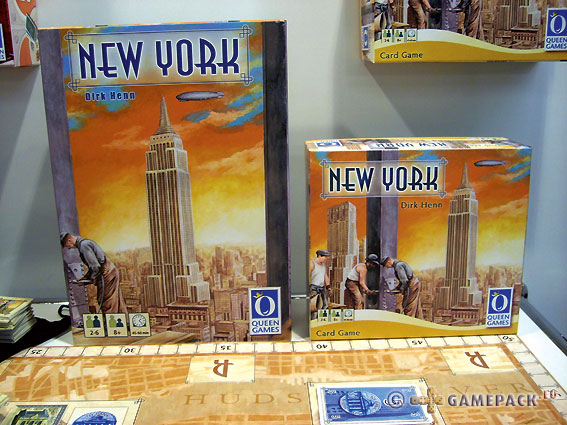 |
|
| x |
|
|
|
|
|
|
|
|
|
|
|
|
|
|
|
|
|
|
|
|
|
|
|
|
|
|
|
|
|
|
|
|
|
|
| Alhambra conquers the United States. Same game, different package. Oh and, throw in a card game at the same time. |
|
| x |
|
|
|
|
|
|
|
|
|
|
|
|
|
|
|
|
|
|
|
|
|
|
|
|
|
|
|
|
|
|
|
|
|
|
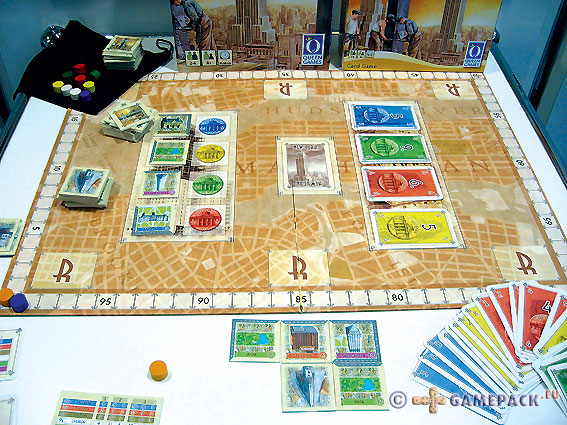 |
|
| x |
|
|
|
|
|
|
|
|
|
|
|
|
|
|
|
|
|
|
|
|
|
|
|
|
|
|
|
|
|
|
|
|
|
|
| New York, Dirk Henn, Queen Games, 2010 - 2 to 6 players, 8 years and up, 45-60 minutes |
|
| x |
|
|
|
|
|
|
|
|
|
|
|
|
|
|
|
|
|
|
|
|
|
|
|
|
|
|
|
|
|
|
|
|
|
|
| x |
|
|
|
|
|
|
|
|
|
|
|
|
|
|
|
|
|
|
|
|
|
|
|
|
|
|
|
|
|
|
|
|
|
|
| c |
|
|
|
|
|
|
|
|
|
|
|
|
|
|
|
|
|
|
|
|
|
|
|
|
|
|
|
|
|
|
|
|
|
|
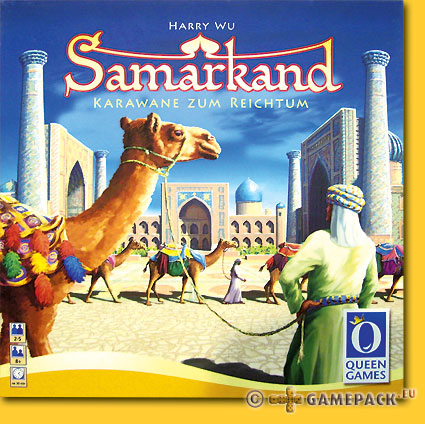 |
Wealthy merchant families roam with their caravans along the Silk Route to make lucrative deals. Players act as traders who marry into these families to influence their business and try to make the most connections. |
|
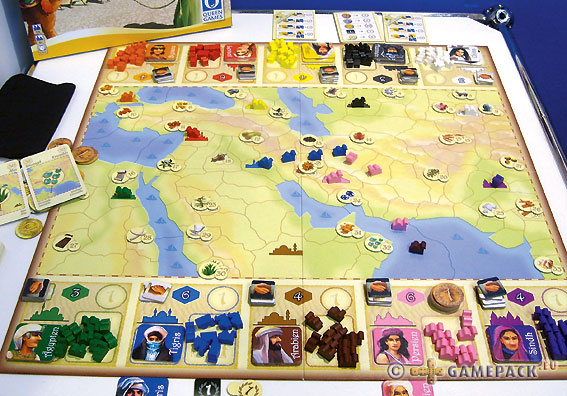 |
|
| x |
|
|
|
|
|
|
|
|
|
|
|
|
|
|
|
|
|
|
|
|
|
|
|
|
|
|
|
|
|
|
|
|
|
|
| In a turn, a player can do one of two things; either marry into a family, or extend a caravan route that must be of their family. The costs for marrying into a family vary and are stated in the family box where the whole family and all the camels house. The costs go into the family chest, from which the cost of extending a caravan route is paid. Placing one camel is free, but for the second must be paid: 1 Dirham. As a reward, the player may take three ware cards, but must keep at least one. These could earn him points at the end of the game, or provide him with money if certain conditions are met. |
|
| x |
|
|
|
|
|
|
|
|
|
|
|
|
|
|
|
|
|
|
|
|
|
|
|
|
|
|
|
|
|
|
|
|
|
|
 |
|
Only two camels can be in an area, both must be of a different family. When two caravans meet for the first time, there is a bonus of 3 Dirham for the family that initiated the connection, and 1 Dirham for the passive family. All players who have married into these families get this bonus. |
|
| x |
|
|
|
|
|
|
|
|
|
|
|
|
|
|
|
|
|
|
|
|
|
|
|
|
|
|
|
|
|
|
|
|
|
|
| When a camel is placed on a wares field, he may take it - this is worth 1 point at games end. If he has the correct ware card, he may sell the card for 3 Dirham, but forfeits the 1 victory point. |
|
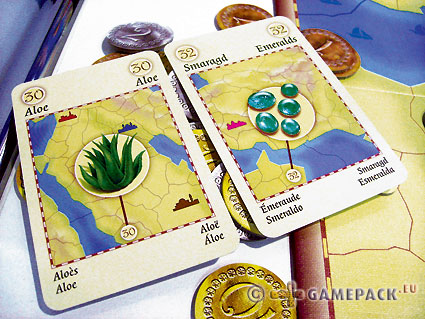 |
|
| x |
|
|
|
|
|
|
|
|
|
|
|
|
|
|
|
|
|
|
|
|
|
|
|
|
|
|
|
|
|
|
|
|
|
|
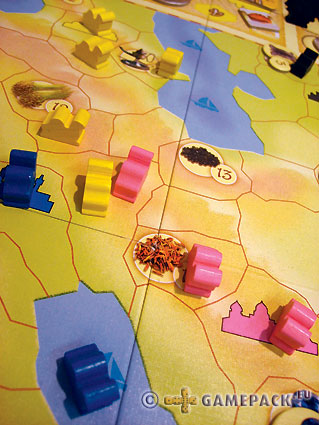 |
|
The game immediately ends when each family has made a connection with another family or one family has made five connections. Points are given for ware cards, ware chits, connection tiles and money.
The rules for two players allow you to marry twice into one family, and the card limit is increased to ten. Further from each family all but one tile goes into a cloth bag. When a player marries, a tile is drawn from the bag. If the space on the family space is free, it is put there, otherwise it is put aside and out of the game.
Without having played the game, from the rules it feels as if 'Chicago Express' has changed into the Orient Express, with buying shares changed to marrying into - it's a stupid thought, I know... |
|
| x |
|
|
|
|
|
|
|
|
|
|
|
|
|
|
|
|
|
|
|
|
|
|
|
|
|
|
|
|
|
|
|
|
|
|
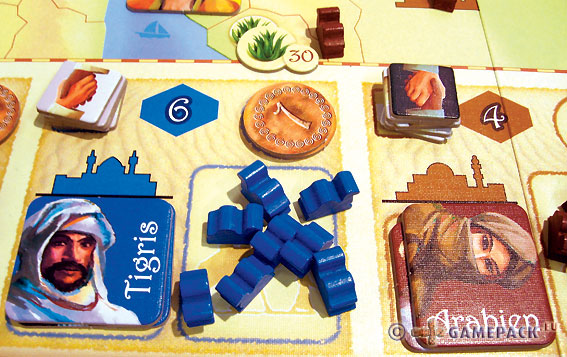 |
|
| x |
|
|
|
|
|
|
|
|
|
|
|
|
|
|
|
|
|
|
|
|
|
|
|
|
|
|
|
|
|
|
|
|
|
|
| Samarkand,David V.H. Peters & Harry Wu, Queen Games, 2010 - 2 to 5 players, 10 years and up, 45-60 minutes |
|
| x |
|
|
|
|
|
|
|
|
|
|
|
|
|
|
|
|
|
|
|
|
|
|
|
|
|
|
|
|
|
|
|
|
|
|
| x |
|
|
|
|
|
|
|
|
|
|
|
|
|
|
|
|
|
|
|
|
|
|
|
|
|
|
|
|
|
|
|
|
|
|
| x |
|
|
|
|
|
|
|
|
|
|
|
|
|
|
|
|
|
|
|
|
|
|
|
|
|
|
|
|
|
|
|
|
|
|
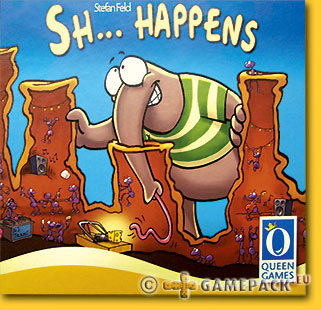 |
I did not dive into the rules enough to find out why the game is called like it is, but it surely must be because two to five players throw dice in four rounds? |
|
| x |
|
|
|
|
|
|
|
|
|
|
|
|
|
|
|
|
|
|
|
|
|
|
|
|
|
|
|
|
|
|
|
|
|
|
 |
| x |
|
|
|
|
|
|
|
|
|
|
|
|
|
|
|
|
|
|
|
|
|
|
|
|
|
|
|
|
|
|
|
|
|
|
| At game start, twelve cards are shuffled and three placed face up. In a turn, a player throws one die and chooses on which card he wants to place it. He must choose the leftmost free column of a card. Some columns have only one row, some have more or depict bonuses. Only one colour can occupy a single column. When obtaining a worm chit, a player may use it for a reroll. |
|
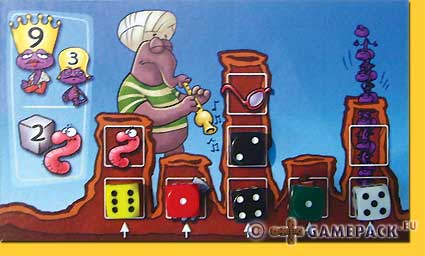 |
|
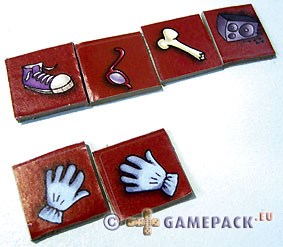 |
When all columns are full, points are awarded for the highest and second highest score per card, with a bonus for the exact amount of worm chits.
Three points go to players who have collected at least two gloves, and the player with the most attributes/bonus chits gets an additional five points. And on to the next round it goes!
A bit weird: there's no punishment in this Stefan Feld game! |
|
| x |
|
|
|
|
|
|
|
|
|
|
|
|
|
|
|
|
|
|
|
|
|
|
|
|
|
|
|
|
|
|
|
|
|
|
| Sh... Happens!, Stefan Feld, Queen Games, 2010 - 2 to 5 players, 8 years and up, 30 minutes |
|
| x |
|
|
|
|
|
|
|
|
|
|
|
|
|
|
|
|
|
|
|
|
|
|
|
|
|
|
|
|
|
|
|
|
|
|
| x |
|
|
|
|
|
|
|
|
|
|
|
|
|
|
|
|
|
|
|
|
|
|
|
|
|
|
|
|
|
|
|
 |
|
|
|
|
|
|
|
|
|
|
|
|
|
|
|
|
|
|
|
|
|
|
|
|
|
|
|
|
|
|
|
|
|
 |
|
|
|
|
|
|
|
|
|
|
|
|
|
|
|
|
|
|
|
|
|
|
|
|
|
|
|
|
|
|
|
|
|
 |
|
|
|
|
|
|
|
|
|
|
|
|
|
|
|
|
|
|
|
|
|
|
|
|
|
|
|
|
|
|
|
|
|
 |
|
|
|
|
|
|
|
|
|
|
|
|
|
|
|
|
|
|
|
|
|
|
|
|
|
|
|
|
|
|
|
|
|
 |
|
|
|
|
|
|
|
|
|
|
|
|
|
|
|
|
|
|
|
|
|
|
|
|
|
|
|
|
|
|
|
| x |
|
|
|
|
|
|
|
|
|
|
|
|
|
|
|
|
|
|
|
|
|
|
|
|
|
|
|
|
|
|
|
|
|
|
 |
|
|
|
|
|
|
|
|
|
|
|
|
|
|
|
|
|
|
|
|
|
|
|
|
|
|
|
|
|
|
|
|
|
|
|
|
|
|
|
|
|
|
|
|
|
|
|
|
|
|
|